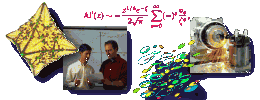|
 |
 |
|
 |
||
| Up |  |
|
 |
Optimal Control of Free Boundary Problems with Surface Tension EffectsHarbir AntilDepartment of Mathematical Sciences, George Mason University Tuesday, December 3, 2013 15:00-16:00, Over the last decade, phenomenon like polymer extrusion has led to advancements in manufacturing of polymer products. Special fluids like ferrofluids have further technologically revolutionized numerous fields, including biomedical, for instance: magnetically guided drug delivery (chemotherapy enhancement), MRI, earth based astronomical telescopes (ferrofluid mirrors), electronic devices (liquid seals in hard disks and micropumps). In order to take the most advantage of these advances more control of the underlying process is required. One of the key issues is the complex nature of the partial differential equations that are required to characterize the phenomena. These are nonlinear, multiscale with typically unknown domains (free boundary problems) with a Young-Laplace equation on the free boundary to account for surface tension. In this talk we will give a novel proof for the second order order sufficient conditions for an optimal control problem where the state system is composed of Laplace equation in the bulk and Young-Laplace on the free boundary. We will use piecewise linear finite elements to discretize the control problem and prove the optimal a priori error estimates. Finally, we will discuss a novel analysis for a problem closely related to the extrusion process where the bulk equations are Stokes equations. Speaker Bio: Currently working as an assistant professor of mathematics at George Mason University. Research interests include: PDEs, optimal control, shape optimization, numerical analysis and model reduction. Contact: G. Dogan Note: Visitors from outside NIST must contact Cathy Graham; (301) 975-3800; at least 24 hours in advance. |